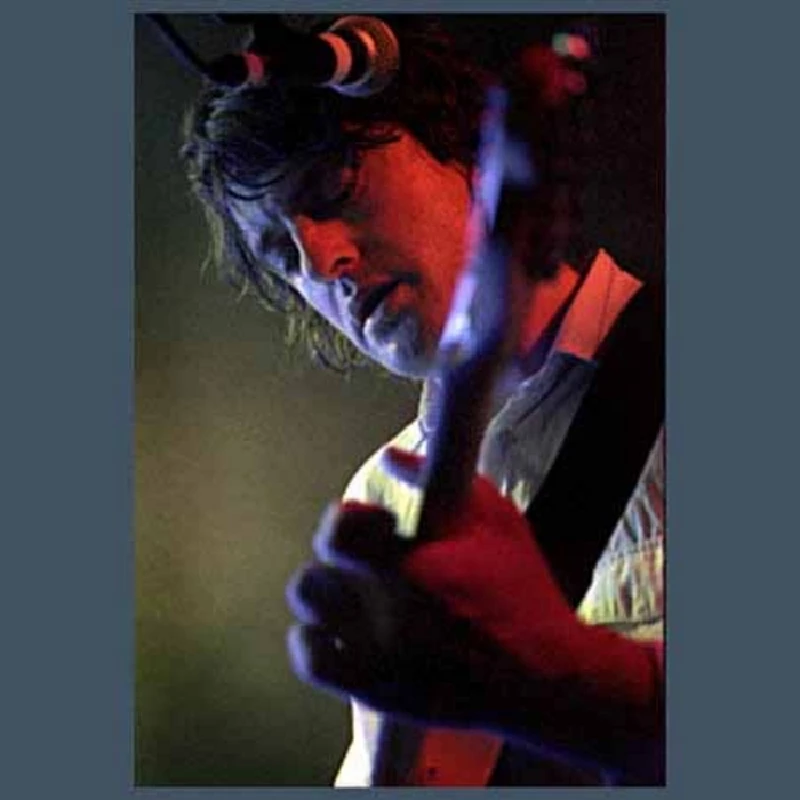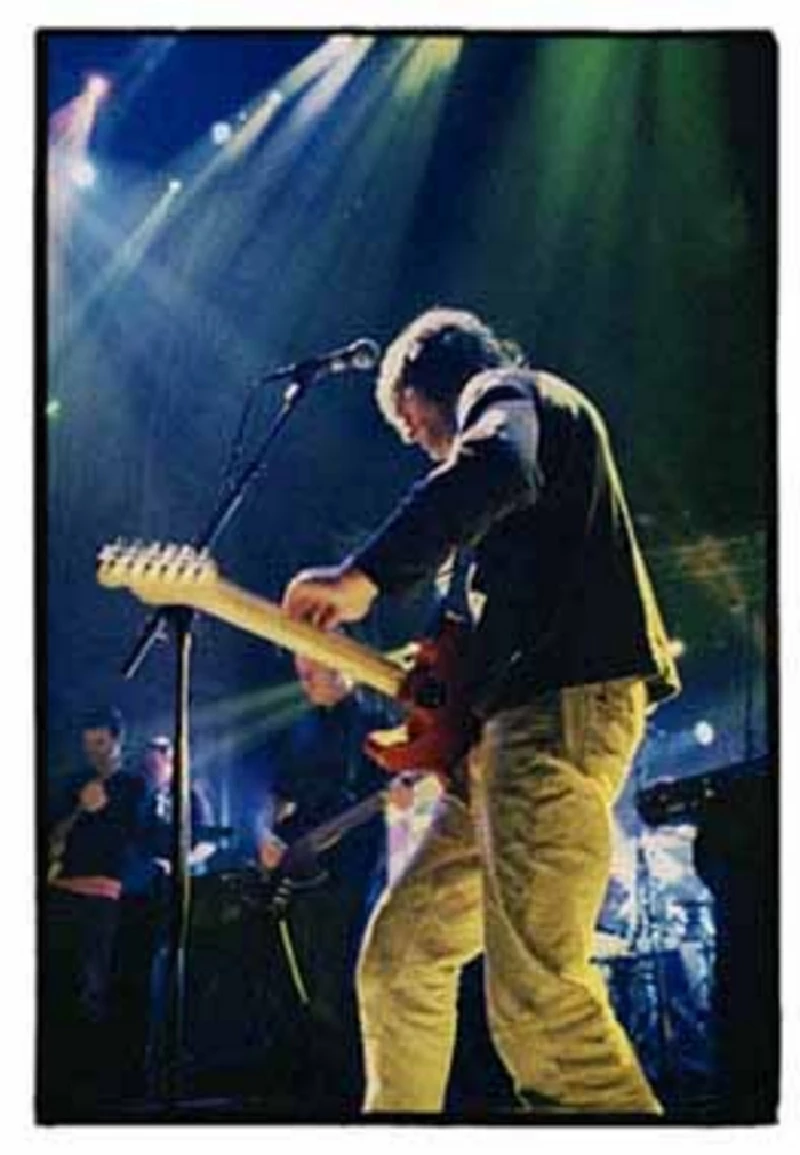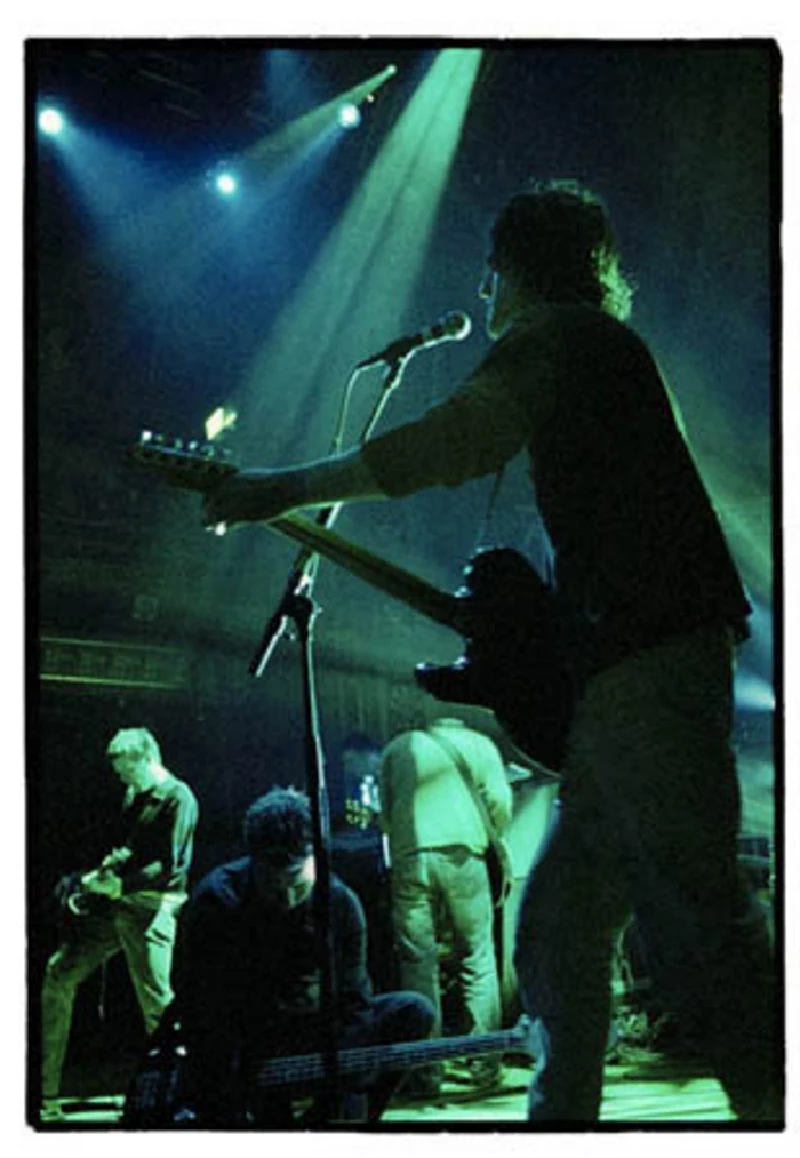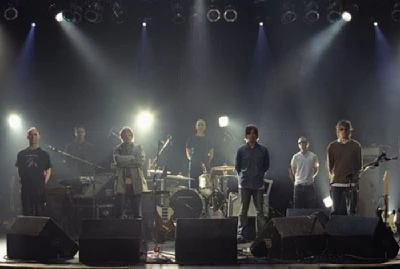Spiritualized - Interview with Jason Pierce
by Benjamin Howarth
published: 2 / 2 / 2004

intro
Backstage at a gig in Exeter, Spiritualized frontman Jason Pierce talks to Ben Howarth about the band's latest album 'Amazing Grace' and the group's current hard touring schedule
No debate about these things. Spiritualized are a band that have made some of the most vivid, exciting and uplifting music in the last decade. They have been widely and heavily acclaimed, even though their sales are not quite in the Radiohead league, and they won NME album of the year in 1997 with the classic 'Ladies And Gentlemen We Are Floating In Space'. Describing their individual sound is tricky, but they merge elements of soul and gospel with punk and filter it through classic rock, and have a noticeable resemblence to Pink Floyd, which is not a bad thing. Their last album has taken a while for me to live with, and perhaps that explains why it was absent from the Album of the Year polls, although they are rarely a true indication of quality anyway, but I can happily proclaim 'Amazing Grace' as a substantial and absorbing piece of work, and currently the Spiritualized disc I reach for first. Jason Pierce is the main figure, songwriter and constant member of the band. When the band came to Exeter on a recent tour, he sat down with me for an interview, which I was told would be brief but, in fact, he was happy to talk for as long as I needed. I’ve read press reports that seem to say he is difficult and even rude. This was not the Jason Pierce I met, who was friendly, cooperative and enthusiastically answered my questions. Several things about Jason Pierce are, I feel, well documented. One, the fall out with his old band. Two, his relationship ‘problems’. Three, his drug ‘problems’. I didn’t ask about any of these. Partly, because I wasn’t sure if there is anything new to be said. Partly, because I didn’t really want to offend him, and I’m not convinced that it’s any of my business anyway. But mainly, I left them off the agenda because whilst anyone can fall out with friends/colleagues, or break up with their partner or take lots of drugs, very few people make music like Jason Pierce, and that was what I was interested in. PB: You seem to be touring a lot recently. How do you find touring. Is it a drag or do you still enjoy it ? JP: Yeah, we’re always on tour. The bit that you see is when we tour here (Britain), and then we head off to Japan and Europe. Playing live and touring is what I’ve always said that this band was set up to do and it’s when this band is absolutely at its best. PB: On this tour, you are doing relatively smaller venues. Is that just because you want a change? JP: The album, ''Amazing Grace', was about trying to capture what I was calling the physicality of performance. I was thinking that rock ‘n’ roll is a very, very rehearsed thing where kids go into the practice spaces and they go out and perform. I wanted to incorporate something that was spontaneous, where it was about responding to the other sounds in the room and making music that way, not about practicing and looking for perfection, but to respond to everybody else. When we came to play that live, it just worked and we hoped that people could witness that from a closer place. It seemed the right thing to do. Also, it just seems that it is easier for us to come to Exeter than for someone from Exeter to come to the next nearest place, which might be Bristol if you’re lucky, or even somewhere like Reading. On this tour, we’ve already come through Derry and Aberdeen and it always seems that if you’re going to play live shows, that’s what you do. You travel. PB: Would it be right to say that the decision to not use as many back up musicians on the new record reflected a growing faith in the new band? JP: Yes, it would be! I think this band is astonishing. It’s quite rare for a group of musicians to follow one kind of ideal. It’s not like I’m changing styles all over the place, following one drive of music and be making music that is so vital. All credit to the people that have come in, because they are so passionate about the music. I’d like to say there is understanding, but it’s almost the opposite of understanding, it’s like they are almost as overwhelmed by the music as the audience is. PB: When you recorded 'Amazing Grace', was it you dictating everything? JP: No. It was really, really free. I had really rough ideas of what the songs should be like and in some cases I had a rough demo, but it didn’t require many words explaining what we doing before the recording process began. PB: Was it a first-take affair? JP: It was generally fifth take mostly. First take, you can really hear people getting their heads around it and not quite knowing when a chorus is coming or what’s going to happen in a song. By the fifth take we had it, and as in everything in life we must have done another four or five before we realised we had it. PB: Was that the first time you’d gone into the studio without having the record fully formed beforehand? JP: Well, it never really fully formed. The thing about this record is that it wasn’t about constructing a record. It wasn’t about making a record from the bass drum up and fitting the sounds around it. It was about capturing a moment in time. I think most pop or rock music is about showing off a talent, like can you move your fingers this fast or I can make my voice sound perfect like Aretha Franklin, but it’s not really the same, and I think most music really lacks that soul, where people have paid their dues and they are really trying to express something that is quite difficult to express. Instead most of it is about a talent,. It’s a lot like watching a juggler. It doesn’t matter how many things you juggle or whether you juggle knives or fire. It’s still only fucking juggling, and that’s what I hear in a lot of music, and I want to hear something. If I’m going to invest my time in listening to somebody’s music, I want them to be telling me the truth and it’s quite difficult to express that. It’s not something they can reel off, and say here you go! PB: Would you say that concept is something that applies to all your other records? JP: They were more about production. They were more like Hendrix’s 'ElectricLadyland', where you use the studio as an instrument because it’s the one thing lacking in live performance, so that was always the idea. But with this record, I kind of got to thinking that so much modern music is all about the production, even if you’ve no song or nothing new to add, you can still carry something a long, long way if it’s well produced. I wanted to make a record that completely avoided that and said these songs had better be able to stand their ground, and the way they are played through has to stand their ground. PB: Would you consider yourself a studio expert? JP: No, far from it. I don’t touch any of it. PB: You just tell other people what to do? JP: I have an engineer, and I lie on the sofa at the back and go, that ‘ll do, that ‘ll do! PB: Do you sometimes find it hard to live up to your previous achievements? I mean, 'Ladies and Gentlemen, We Are Floating In Space' is regularly labelled among the best albums of all time for example? JP: It’s not the achievement; it’s the observation of something that is out of my control. It’s not that it is a greater achievement than anything else that preceded or followed it. The achievements are my achievements, not the ability of the press or public to get with it, which is such a fickle thing anyway. The vagaries of fashion are not important to what we are doing. PB: Do you read the record reviews? JP: No, not at all. I think that’s what people mean when they talk about 'Ladies and Gentlemen'. It seems like a bigger deal because it was picked up at the time. PB: I’d probably say that I like some of the others just as much. JP: It’s just the nature of being a fan. I think fans naturally tend towards conservatism, because you can’t be a fan of something that’s radically changing, and I think that fans will always have favourites. I’m fine with the idea that the last album might be as good as it’s ever going to get with you, but sometimes fans that want to stay at one place can’t expect the artist to stay there with them, and that’s just how it goes. I have my very favourite Sam Cooke tracks. I’ve got my favourite Cramps and Miles Davis tracks, but it doesn’t negate everything else at the side of it. Music needs to continually evolve. PB: Do you think that you’ve always had musical influences that have always stayed with you all the way through? JP: Yes, the Cramps and the Stooges hitting up against the Staple Singers. They were the first things I ever heard, and it’s like Heaven and Hell, and its really rooted in rock and roll. And as much as I listen to classical music and jazz and everything, you know, Hawaiian music and whatever comes in, the core is always rock and roll, and I always see it as a rock and roll band. PB: What about the current scene? Do you buy many CDs now? JP: I think music is exactly the same as it’s ever been. I like the music that is outside the circle, trying to push Western Music or whatever into the future. I think so much music is safely in the centre, people copying someone’s style or attitude and passing it off as your own, and people who are interested in the business of music, which is why you get so many trends. Here’s another one of these stadium acts because that is what’s selling. PB: A lot of people, when 'Let It Come Down' came out, said it was very similar to 'Ladies And Gentlemen', which I didn’t really get… JP: I don’t think you can equate the distance of the progression. Tt’s better to go over the tiniest inch of new ground than repeat yourself. The best motto is never join the Catering Industry, never be able to go, here’s what you asked for, try and take tiny steps which lead to bigger steps later on. PB: And do you think that 'Let It Come Down' was one of those tiny steps? JP: Well, it was a huge undertaking for me. Writing arrangements for a huge orchestra. I don’t read music to any degree, I can work it out like I can work out French with an English-French dictionary, but it’s that slow. PB: Were you working with anyone? JP: I sung it into one of those (a Dictaphone – PB), and then had it transposed. PB: Which is exactly the way Paul McCartney works! JP: Does he? He must read music though surely… PB: No, he doesn’t! JP: Wow. I didn’t know that. PB: Moving on, in a lot of interviews I’ve read with you, you seem to come across as very private and serious. Would you say that’s the way you actually are, or is it just your way of keeping music at the forefront? JP: Yeah, only because I loathe the kind of interviews where a lot of stuff is selling personality, what gets you down, what gets you up? Or if it’s not that, it’s people achieving hype by getting on someone’s back. PB: And maybe political statements as well. JP: Well fair enough if it’s something that is meaningful, but a lot of time I think people get involved just to win column inches and that’s not what I got involved for. PB: Do you know where Spiritualized will be going next? JP: Well, we tour until the money runs out, and then we make the next record! PB: So you’ve no idea what direction that will take? JP: No, it’ll come about within this year. But the way we play live isn’t going through the motions. It’s about going outwards and searching. It’s not cabaret, so that will lead us onwards. PB: In Spiritualized you are the absolute mainman, whereas in Spacemen 3 you had a group. Do you miss the creative foil to feed off at all? JP: if anything, it’s the complete opposite. It’s more collaborative in this band, and less so in Spacemen 3. Because the people I’m with now are really, really passionate about music, a thing that comes with age and making music. Spacemen 3 were just smalltown friends. They weren’t bass players or drummers or guitarists, so if anything it was less involvement, it was much more, this is the song and here are the parts, whereas in this band everyone has more to voice and there is more coming my way, not less. There is something great about being in a band as primitive as Spacemen 3, but also there is only so much you can do with it. PB: How did you find the current band? JP: Well, I left it with Tim, who plays keyboards for us while I was spending months and months transposing all the things I had on tape into orchestrations, and then it went through a few changes, like Richard from Echoboy who dropped his band and came in with us full time. PB: This time round, as opposed to the Electric Ballroom shows in London I saw in September, you seem to be playing a more widely orientated set, with tracks from more albums. JP: Ummm, I suppose so… The general rule is not to change the setlist, because if you don’t play a song night after night, you’ve no way of determining if it is good or not. But we did change the setlist a little when we got back from America. PB: I think that is all I have to ask. Thanks a lot! JP: OK, great!
Band Links:-
https://www.facebook.com/spiritualizedofficial/https://twitter.com/officialspzd
Picture Gallery:-





live reviews |
|
Royal Festival Hall, London, 1/8/2004 |

|
| In the luxurious surroundings of London's Royal Festival Hall, Dominic Simpson watches Spiritualized play a frequently spellbinding set, but is left wondering, after 20 years of perfecting his vision, where frontman Jason Pierce might go next |
| Lemon Grove, Exeter University, Exeter, 3/2/2004 |
favourite album |
|
Ladies and Gentlemen, We are Floating in Space (2002) |

|
| In the latest in our series, in which a different one of our writers writes about a favourite album of his or her choice,Cila Warncke examines Spiritualized's 1997 masterpiece 'Ladies And Gentlemen We Are Floating In Space' |
soundcloud
reviews |
|
Sweet Heart, Sweet Light (2012) |

|
| Self-indulgent and over-intense latest album from psychedelic rockers, Spiritualized |
| Songs in A & E (2008) |
| Amazing Grace (2003) |
most viewed articles
current edition
Carl Ewens - David Bowie 1964 to 1982 On Track: Every Album, Every SongArmory Show - Interview with Richard Jobson
John McKay - Interview
Colin Blunstone - Thalia Hall, Chicago, 16/7/2025
Bathers - Photoscapes 1
Billie Eilish - O2 Arena, London, 10/7/2025
Loft - Interview
Visor Fest - Valencia, Spain, 26/9/2025...27/9/2025
Sir Tim Rice - Interview
Robert Forster - Interview
previous editions
Heavenly - P.U.N.K. Girl EPManic Street Preachers - (Gig of a Lifetime) Millennium Stadium, Cardiff, December 1999
Beautiful South - Ten Songs That Made Me Love...
Peter Perrett - In Dreams Begin Responsibilities Interview Part One
Boomtown Rats - Ten Songs That Made Me Love....
Oasis - Oasis, Earl's Court, London, 1995
Coldplay - Wembley Arena. London, 16/8/2022
Trudie Myerscough-Harris - Interview
Pixies - Ten Songs That Made Me Love...
Prolapse - Interview
most viewed reviews
current edition
Davey Woodward - Mumbo in the JumboSick Man of Europe - The Sick Man of Europe
Lucy Spraggan - Other Sides of the Moon
Blueboy - 2
Amy Macdonald - Is This What You've Been Waiting For?
Bush - I Beat Loneliness
Suzanne Vega - Flying With Angels
Phew, Erika Kobayashi,, Dieter Moebius - Radium Girls
Alice Cooper - The Revenge of Alice Cooper
Cynthia Erivo - I Forgive You
Pennyblackmusic Regular Contributors
Adrian Janes
Amanda J. Window
Andrew Twambley
Anthony Dhanendran
Benjamin Howarth
Cila Warncke
Daniel Cressey
Darren Aston
Dastardly
Dave Goodwin
Denzil Watson
Dominic B. Simpson
Eoghan Lyng
Fiona Hutchings
Harry Sherriff
Helen Tipping
Jamie Rowland
John Clarkson
Julie Cruickshank
Kimberly Bright
Lisa Torem
Maarten Schiethart